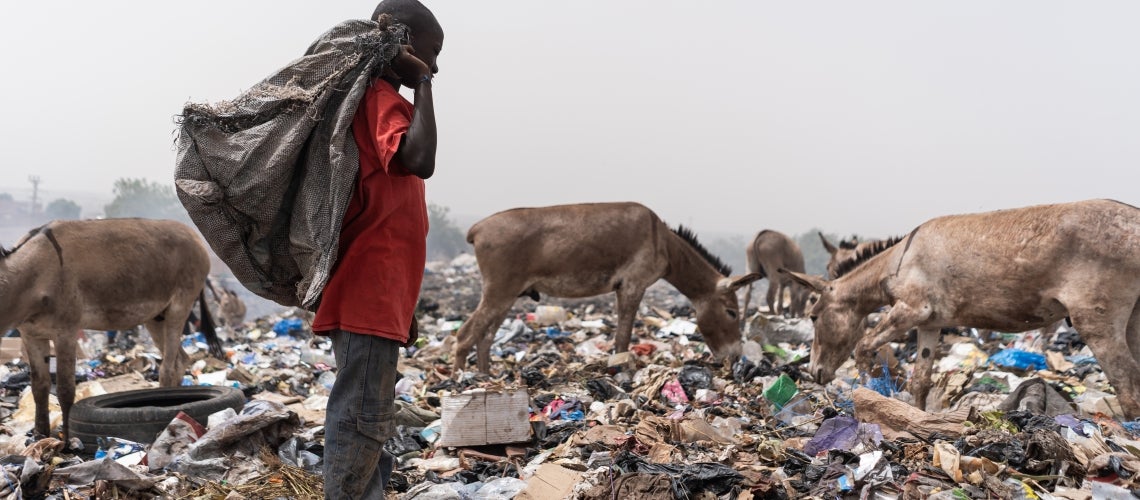 A boy in Africa standing in a landfill with a black plastic bag on his shoulder looking for reusable material, surrounded by hungry garbage grazing donkeys.
A boy in Africa standing in a landfill with a black plastic bag on his shoulder looking for reusable material, surrounded by hungry garbage grazing donkeys.
When future generations share the story of plastic pollution, it will include graphic images of turtles choking on plastic debris, zooming out to show beaches and communities laden with trash, and panning to medical reports showing microplastic in the average person’s bloodstream. This is a story that started as an environmental crisis, and quickly became an economic and health crisis. And it’s a story that intersects with the triple planetary crises we are grappling with today: biodiversity, climate, and pollution. We are on the brink of writing the next important chapter in this story.
We do know that plastic pollution must end. Of the 460 million tons of plastic produced in 2019, 353 million tons were discarded. This disposing includes the okay (recycling, even if it’s globally less than 9%), the bad (50% ending up in unmanaged dumps) and the ugly (the remainder simply ending up poisoning the environment).
We know that avoiding, minimizing, mitigating, and properly disposing of plastic waste is not simply good civic sense. It is a necessity. Too many municipalities simply can’t afford to manage the current trash loads, pushing them towards bankruptcy and straining their social contract.
Beyond communities littered with trash, microplastics are literally raining from the sky, and are found on mountaintops, and in our ocean. Microplastics and toxic chemicals (additives in plastic products) have found their way into our food, and into our bodies, and the long-term health effects remain to be seen.
And we now know that we can’t simply recycle our way out of plastics pollution, which presents its own series of challenges. The path out of plastic pollution must prioritize strategies like reducing our overall single-use plastic consumption and scaling up reuse -- that offer the best opportunity for widescale change. We also need to figure out how best to deal downstream with residual (and often toxic) waste. All three lifecycle stages of plastics (upstream, midstream and downstream) are included in the recent discussions at the second session of the Intergovernmental Negotiating Committee to develop an international legally binding instrument on plastic pollution, including in the marine environment (INC-2).
Two issues thread the INC-2 discussions:
- First, what does success look like? Robust and responsive plastics metrics will allow countries and companies to set targets, measure baselines, and quantify progress. Better data can also attract investment. It will be critical to ensure that these metrics are suitable for data-poor countries, often with low capacity and budgets to monitor or track plastic pollution.
- Second, where will countries find additional financing to comply with targets and commitments under a new instrument to end plastic pollution? National budgets are not going to be enough. International public finance and private capital will be keys to success. The former must be accessible at the right price and targeted appropriately. It can be used to help guide policies and strengthen markets. Private capital can come in the form of technological innovation, and collected through extended producer responsibility schemes, fees, and taxes.
As the world looks toward actionable solutions to the plastic pollution crisis, I want to advocate for another key consideration: that the solutions do not penalize poor countries, or poor communities in every country. Plastics have been a boon to development, often delivering low-cost, available, and portable ways for communities to access basic goods, resources, build wealth, and contribute to growth. In many communities and for many micro- and small-businesses, single-use plastics are often the only available and affordable way to go about their day-to-day lives, do business, make money. We must design solutions with the needs and realities of the poorest communities in mind, to ensure a “just transition.”
Managing plastic waste will prove the concept that it is possible for economies to work for everyone, everywhere, and that economic growth can help end environmental crises, rather than cause them. Managing plastic waste is the next step towards the green, resilient, inclusive economies - circular economies - of tomorrow.


Join the Conversation